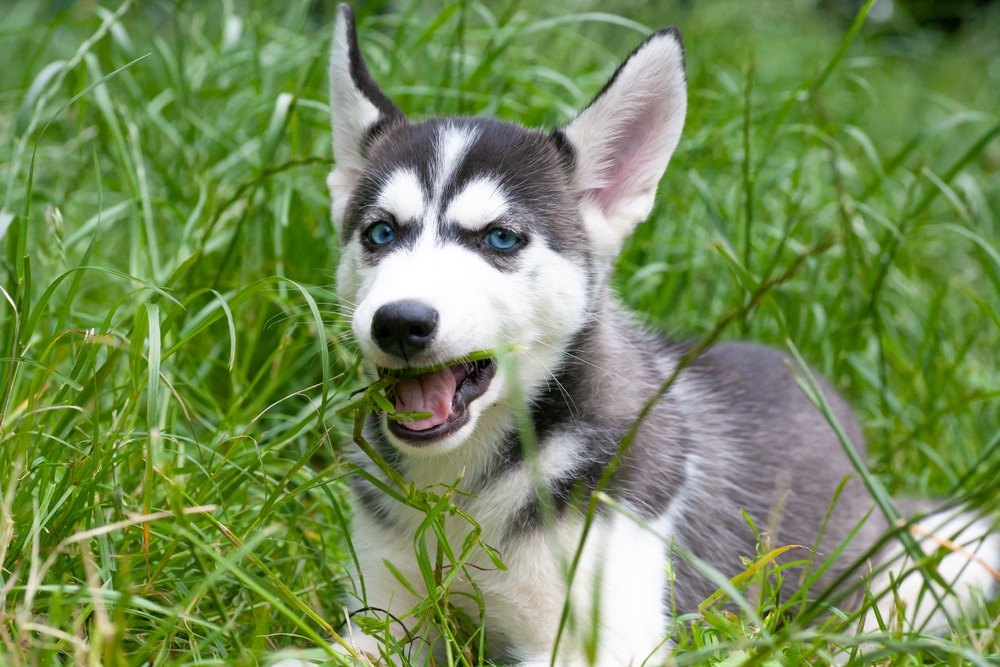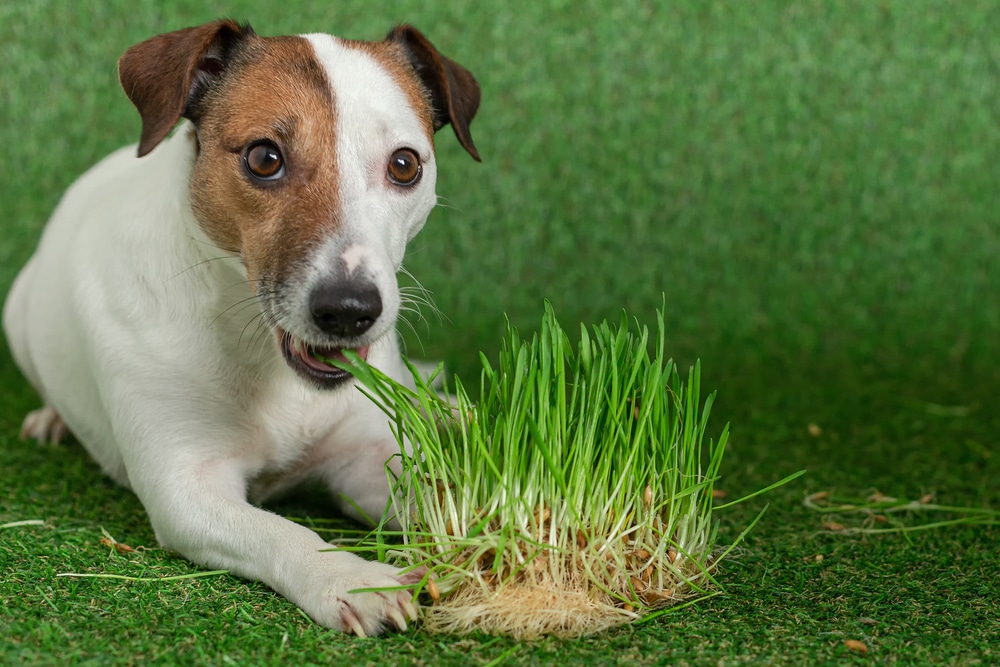Grass and greenery draw in dogs. They love the smell and feel of grass, flowers, and bushes, anything with a bit of green. No wonder our furry friends love rolling around in the grass, nibbling on it, or even eating it. But can dogs eat grass?
Grass is generally safe for dogs to eat and can even have some health benefits. It is high in fiber, which aids digestion and helps prevent constipation. It contains iron, calcium, magnesium, potassium, and zinc. Also, it contains many vitamins and minerals that dogs need to stay healthy such as vitamin A and vitamin C. If your pup has been munching on chemically treated lawns or ones with added fertilizers though, it could lead to an upset stomach or even poisoning.
Table of Contents
Is Eating Grass Beneficial For Dogs?
Eating grass can be beneficial for dogs. It can help with digestion, aid in expelling parasites from the intestines and even act as a mild laxative. When grass and plant materials are consumed, they generate a fibrous bulk that aids in the proper movement of food through the intestines.
Why Do Dogs Eat Grass?

Dogs are simply trying to satisfy their curiosity and explore the world around them. They may also be seeking out a nutritional supplement to their diet, as some plants can provide important vitamins and minerals. So, here are some reoccurring reasons why your pup may be drawn to grass.
Nutritional Needs
Grass can provide essential vitamins and minerals that dogs may not get from their regular diet. It contains iron, calcium, magnesium, zinc, and other trace minerals necessary for normal bodily functions. This nutrient-rich superfood is also packed with phytonutrients, high in potassium, and laden with chlorophyll. These are all essential for maintaining your pup’s health.
Boredom
We know that a bored pup is likely to find something to do, even if it means gnawing on the blades of grass in your lawn! Eating grass can be a way for dogs to pass the time and can help keep them entertained. Control your dog’s behavior with a mix of positive reinforcement and quality bonding time by throwing a ball.
For Antacid
Grass can also be used as a natural antacid for dogs. Dogs often vomit acidic bile when their stomachs are empty. The bitter bile can be quite distressing to a dog’s digestion, so much like us humans who take antacids for relief, dogs may resort to eating grass to expel the caustic liquid and alleviate their discomfort. The grass may help alleviate the symptoms of heartburn or indigestion as well.
To Eradicate Hunger
Hunting and gathering prey, like birds or small rodents, can be quite an effort for dogs. They may turn to greenery for sustenance if they cannot find other food sources. So, when dogs are hungry, the grass serves as a cheap and easy snack.
Eating grass can help your pup fill its stomach until its next meal too. It’s essential to keep in mind that some types of grass can lead to a rumbling tummy and upset stomach, so keep an eye out for any adverse reactions.
Gastrointestinal Issues
Eating grass can be safe for gastrointestinal issues in dogs, as it is a natural source of fiber.
Fibers reduce the inflammation of the stomach and intestines and keep the digestive system running smoothly.
It also encourages regular bowel movements and helps to prevent constipation. Grass also helps soothe puppies’ stomachs and reduces vomiting.
Hunting Instincts
Dogs may have inherited an instinctual need to eat grass that was passed down from their wild ancestors. Wolves were scavengers and hunters, and they would consume any type of food they could find to survive.
This would’ve included plants, grasses, and other foliage. This instinctive behavior has been passed on to modern domesticated dogs that may turn to grass when they need extra nutrition.
Curiosity
Dogs are naturally curious animals and may simply be exploring the world around them by sampling different flavors, textures, and smells of grass. So, it’s no surprise that they would wander to the lush greenery in your garden. They may also just be looking for something to do and find eating grass a fun activity.
Pica
Eating grass can be a sign of pica in dogs. Pica is an abnormal craving for non-food items like grass, dirt, or rocks. Eating grass can also indicate nutrient deficiencies resulting from malabsorption or malnutrition. Such conditions should be addressed by your veterinarian to avoid any potential health issues.
Which Ingredients In Grass Make A Dog Sick?
Grass has many beneficial properties, but it’s not always an ideal snack for your pup. Some types of grass have higher concentrations of certain chemicals that can prove toxic to dogs. Here are some common ingredients found in grass that can make a dog sick.
Herbicides
Herbicides are used to kill unwanted weeds and prevent them from growing in gardens. These can be hazardous to dogs’ health. Symptoms may include staggering, skin irritation, breathing difficulties, unsteadiness or weakness, and more.
To avoid exposure to potentially toxic herbicides, consider using natural options such as hand-pulling weeds or manual cultivation to control weed growth. Treatment may involve decontamination and supportive care.
Pesticides
Pesticides can be toxic to dogs if ingested in large quantities. Common side effects of pesticide poisoning in dogs include vomiting, diarrhea, loss of appetite, lethargy, and seizures. In severe cases, it may even cause death.
Fertilizers
Fertilizers are materials that provide essential nutrients to plants and help them grow. However, certain fertilizers can be harmful to dogs if ingested or inhaled.
Symptoms of fertilizer poisoning may include abdominal pain, drooling, vomiting, bowel obstruction, increased salivation, cardiac arrest, discolored gums, and even inflammation of the liver and pancreas.
Fecal Material
Fecal material can be spread in the grass through contact with pets or other animals that have defecated on the lawn. This material may contain viruses, bacteria, parasites, and other disease-causing agents that can cause the grass to be toxic.
If your dog eats the grass with fecal material, it may be sickened. To prevent exposure to fecal material, it is important to regularly clean up after your pet or other animals that use the area as a toilet.
Is It Normal For Dogs To Vomit After Eating Grass?
Yes, it is normal for dogs to vomit after eating grass. This usually occurs due to an upset stomach caused by consuming too much or the wrong type of grass.
If your dog vomits regularly after eating grass, it could be a sign of an underlying health issue, and you should visit your veterinarian.
How to Stop Your Dog From Eating Grass?
It can be difficult to stop a dog from eating grass, but there are steps you can take to discourage it. They are the following:
- Make sure your dog has plenty of toys and other activities available to keep them entertained and distracted from the grass.
- Give the dog a bone or other chewable toy to help satisfy its urge to chew.
- Take your dog for regular walks or play sessions in pet-friendly areas that don’t have grass.
- Monitor your dog closely when they are outside and discourage them from munching on the grass.
In Conclusion: Can Dog Eat Grass?
Dogs can safely eat grass if their diet is otherwise balanced and they don’t overindulge. But pet owners need to keep an eye on their dogs when they are outside and discourage them from eating large amounts of grass. If you are concerned about your pup’s health after consuming grass, it is best to consult a veterinarian for advice. It is important to be aware of any potential hazards in your lawn that may make a dog sick as well. By taking these precautions, you can help keep your pup safe and healthy. Also, avoid letting your dog eat grass from areas you’re not sure of.
Have you ever seen your dog eating grass? How did you handle it? We’d love to hear about your experience in the comments section below!
